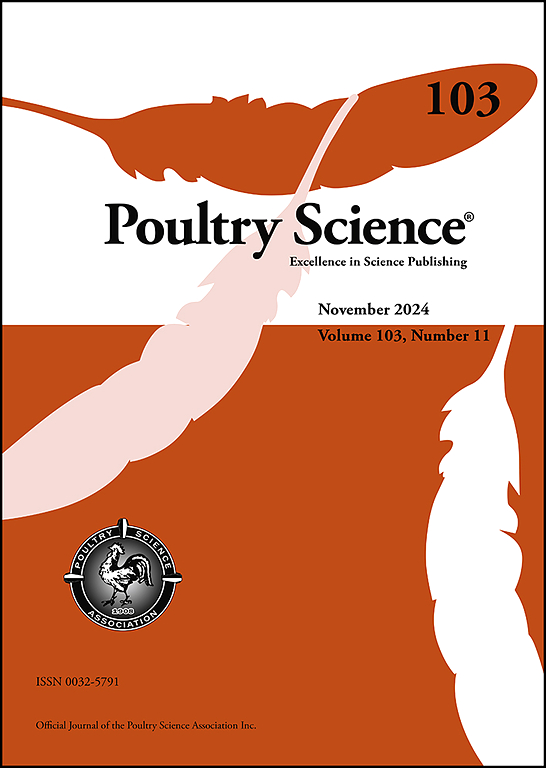生物炭和益生菌增强鹌鹑慢性黄曲霉中毒抗氧化防御,提高产品质量
IF 3.8
1区 农林科学
Q1 AGRICULTURE, DAIRY & ANIMAL SCIENCE
引用次数: 0
摘要
黄曲霉毒素,特别是黄曲霉毒素B1 (AFB1),是一种对家禽生产性能、健康和产品质量产生不利影响的强效真菌毒素。缓解战略对家禽生产力至关重要。本研究评估了豆蔻生物炭和发酵乳杆菌减轻afb1对鹌鹑的毒性作用,重点研究了性能、抗氧化状态和产品质量。以生长(7-35 d)和产蛋(70-98 d)期的鹌鹑为试验对象,分别在5种饲粮处理下进行试验:阴性对照(基础饲粮)、阳性对照(AFB1污染饲粮)、AFB1饲粮中添加Mycofix Plus、生物炭或生物炭与发酵乳杆菌的组合。评价生长性能、抗氧化状态、肉蛋品质和肝酶活性。AFB1显著降低生产性能,降低肉蛋品质,升高氧化应激和肝酶(P <;0.01)。添加生物炭,特别是与发酵乳杆菌结合,可显著缓解这些影响,改善体重、谷胱甘肽过氧化物酶活性,降低丙二醛和肝酶水平(P <;0.01)。生物炭及其与发酵乳杆菌的组合有效地减轻了鹌鹑的黄曲霉中毒,提高了健康和生产力指标。在家禽日粮中加入生物炭和发酵乳杆菌是应对霉菌毒素挑战、改善家禽系统经济和产品质量结果的一种有希望的方法。本文章由计算机程序翻译,如有差异,请以英文原文为准。
Boosting antioxidant defense and enhancing product quality by biochar and probiotics under chronic aflatoxicosis in quails
Aflatoxins, particularly aflatoxin B1 (AFB1), are potent mycotoxins adversely affecting poultry performance, health, and product quality. Mitigation strategies are critical for poultry productivity. This study assessed the efficacy of Prosopis farcta biochar and Lactobacillus fermentum in mitigating AFB1-induced toxicity in quails, with a focus on performance, antioxidant status, and product quality. Two experiments were conducted with quails during growing (7–35 days) and laying (70–98 days) periods under five dietary treatments: Negative Control (basal diet), Positive Control (AFB1-contaminated diet), and AFB1 diets supplemented with Mycofix Plus, biochar, or biochar combined with L. fermentum. Growth performance, antioxidant status, meat and egg quality, and liver enzyme activity were evaluated. AFB1 significantly impaired performance, reduced meat and egg quality, and elevated oxidative stress and liver enzymes (P < 0.01). Supplementation with biochar, particularly in combination with L. fermentum, significantly alleviated these effects, improving body weight, glutathione peroxidase activity, and reducing malondialdehyde and liver enzyme levels (P < 0.01). Biochar and its combination with L. fermentum effectively mitigated aflatoxicosis in quails, enhancing health and productivity metrics. Integrating biochar and L. fermentum in poultry diets is a promising approach to managing mycotoxin challenges, improving economic and product quality outcomes in poultry systems.
求助全文
通过发布文献求助,成功后即可免费获取论文全文。
去求助
来源期刊

Poultry Science
农林科学-奶制品与动物科学
CiteScore
7.60
自引率
15.90%
发文量
0
审稿时长
94 days
期刊介绍:
First self-published in 1921, Poultry Science is an internationally renowned monthly journal, known as the authoritative source for a broad range of poultry information and high-caliber research. The journal plays a pivotal role in the dissemination of preeminent poultry-related knowledge across all disciplines. As of January 2020, Poultry Science will become an Open Access journal with no subscription charges, meaning authors who publish here can make their research immediately, permanently, and freely accessible worldwide while retaining copyright to their work. Papers submitted for publication after October 1, 2019 will be published as Open Access papers.
An international journal, Poultry Science publishes original papers, research notes, symposium papers, and reviews of basic science as applied to poultry. This authoritative source of poultry information is consistently ranked by ISI Impact Factor as one of the top 10 agriculture, dairy and animal science journals to deliver high-caliber research. Currently it is the highest-ranked (by Impact Factor and Eigenfactor) journal dedicated to publishing poultry research. Subject areas include breeding, genetics, education, production, management, environment, health, behavior, welfare, immunology, molecular biology, metabolism, nutrition, physiology, reproduction, processing, and products.
 求助内容:
求助内容: 应助结果提醒方式:
应助结果提醒方式:


